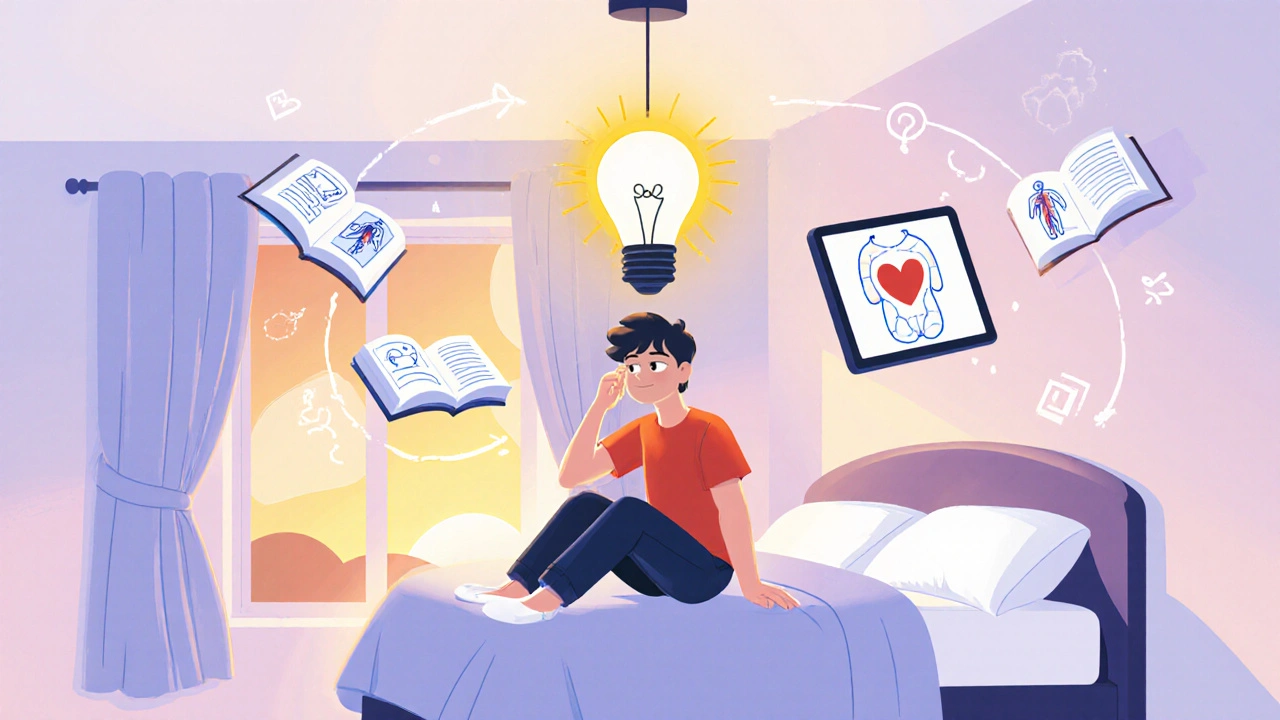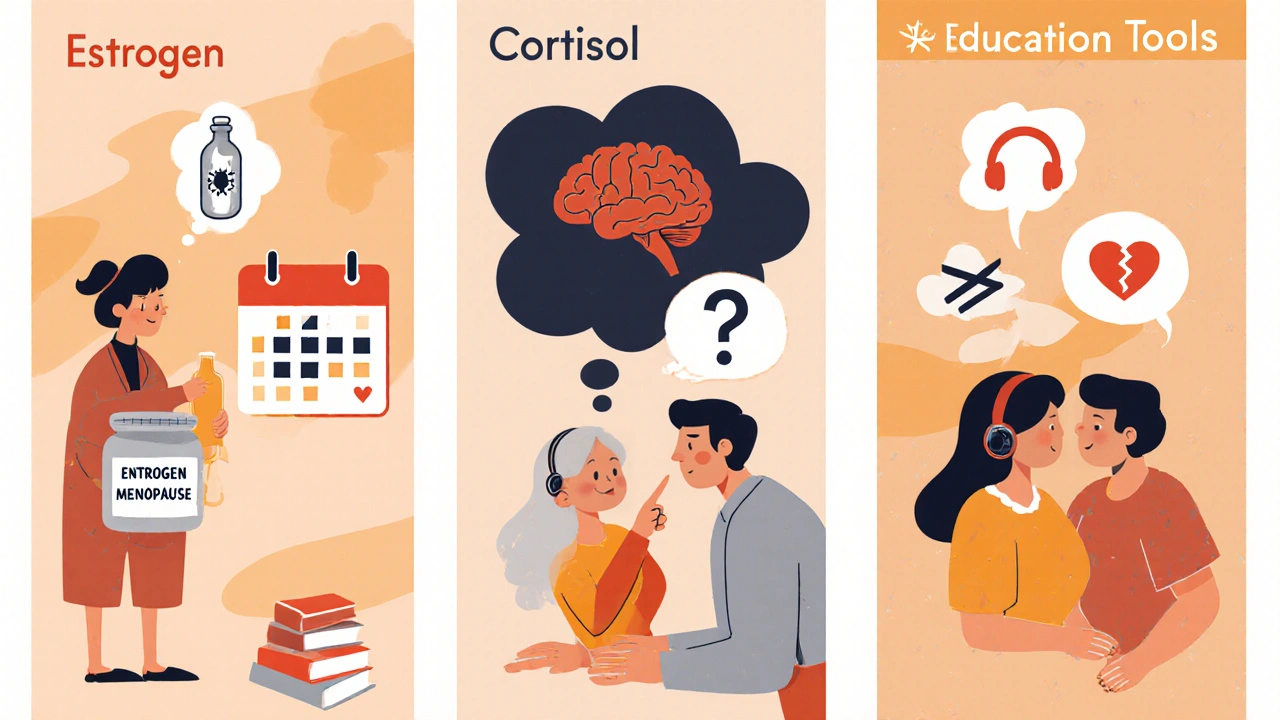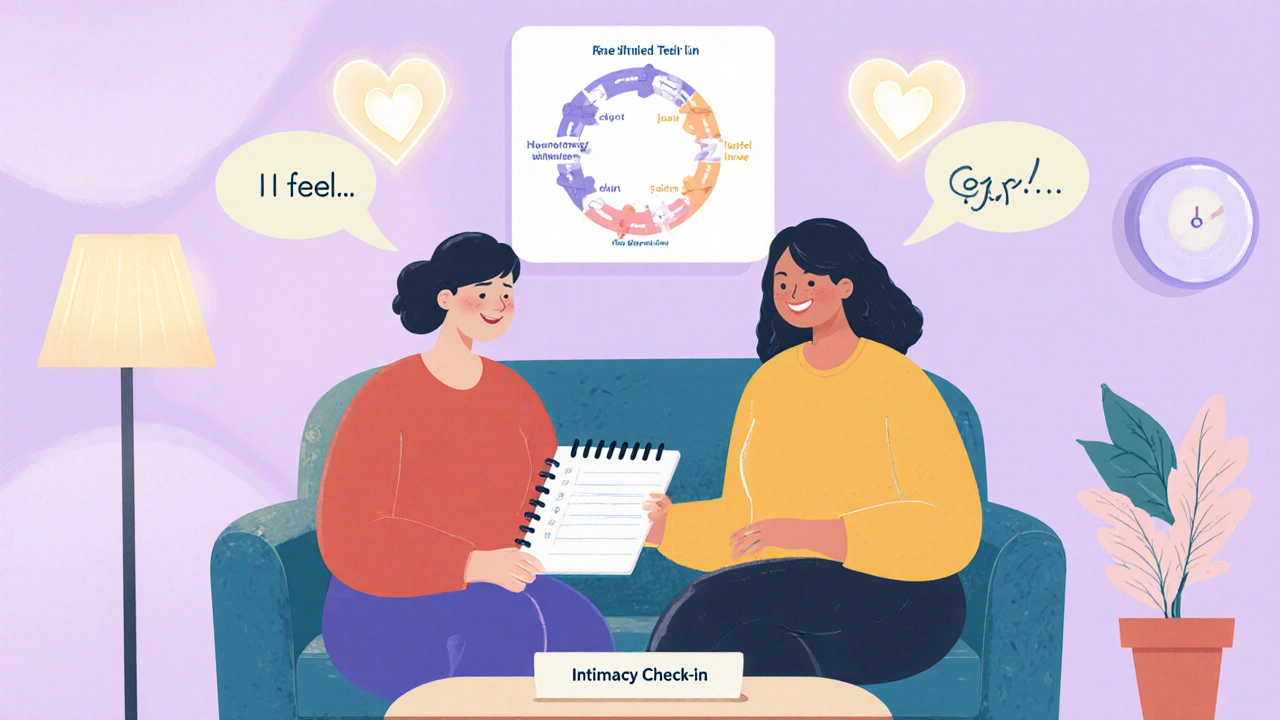How Sexual Education Helps Manage Low Libido
 Oct, 22 2025
Oct, 22 2025
When it comes to feeling less interested in sex, many people think the problem is just “in the bedroom.”sexual education is a structured set of information and skills that help individuals understand their bodies, desires, and healthy sexual behavior. In reality, a solid education can shine a light on hidden medical, emotional, and relational factors that drag desire down. Below you’ll discover why learning matters, what to teach yourself or your partner, and how to turn knowledge into a steadier spark.
Understanding Decreased Sexual Desire
Low libido, medically called Decreased sexual desire, isn’t a mysterious curse. It often lines up with three broad categories:
- Physical influences - hormonal shifts, medication side‑effects, chronic illness, or fatigue.
- Psychological factors - stress, anxiety, depression, or negative body image.
- Relationship dynamics - poor communication, unresolved conflict, or mismatched sexual scripts.
When any of these areas go unchecked, desire can dip dramatically. Recognizing the specific trigger is the first step toward fixing it.
What Sexual Education Really Means
Many people picture sex ed as a brief school lesson about condoms. Modern Comprehensive sex education expands far beyond anatomy. It includes:
- How the arousal cycle works for different genders.
- What hormones drive desire and how they change over life stages.
- Emotional literacy - naming feelings that affect sex, like shame or excitement.
- Communication tools for expressing needs without blame.
- Evidence‑based coping strategies for stress, fatigue, and body‑image concerns.
When you equip yourself with this toolbox, you stop guessing and start acting.
How Education Targets Physical Causes
Physical contributors are often the easiest to spot with the right knowledge. For example, a drop in estrogen during menopause can shrink vaginal lubrication, making sex uncomfortable and discouraging interest. Knowing this, a woman can explore low‑dose hormonal therapy or water‑based lubricants and instantly feel more eager.
Similarly, men on antidepressants might experience reduced testosterone. Understanding the link lets them talk to a doctor about dosage tweaks or alternative medications instead of assuming “I’m just not into it anymore.”
Key takeaway: education turns vague discomfort into a treatable symptom.

Addressing Psychological Barriers Through Learning
Stress and anxiety hijack the brain’s reward system, flooding it with cortisol and sidelining dopamine - the chemistry of pleasure. Learning about this neuro‑biological tug‑of‑war helps you recognize that a low‑desire night isn’t a personal failure; it’s a stress response.
Mindfulness techniques, such as body‑scan meditation, can lower cortisol levels and re‑activate the pleasure pathways. Courses in Mindfulness techniques offer step‑by‑step guides, making it easier to practice daily.
Body image also plays a huge role. Evidence shows that people who receive tailored education about normal sexual response cycles feel more confident, reducing shame and boosting desire.
Improving Communication and Relationship Dynamics
Even the most accurate medical knowledge falters if partners can’t talk about it. Relationship communication training teaches you to:
- Use “I” statements (“I feel …”) instead of blame.
- Set aside a regular “check‑in” time to discuss intimacy without distractions.
- Identify each partner’s love languages and map them onto sexual expectations.
Couples who invest in intimacy counseling report a 30 % rise in desire after just six weeks, according to a 2023 New Zealand study.
Practical Steps to Build an Education Plan
Now that you see the why, here’s a concrete roadmap you can start today:
- Self‑audit. Write down any physical symptoms (e.g., fatigue, medication changes), emotional states (stress, depression), and relationship patterns (arguments, silence about sex).
- Learn the basics. Spend 30 minutes on reputable resources - for instance, the World Health Organization’s sexual health fact sheets or the New Zealand Mental Health Commission’s guide on stress and intimacy.
- Identify gaps. Ask yourself which of the three categories from the audit feel least understood.
- Targeted learning. Choose a short course or article that fills each gap. Below is a quick reference table.
- Apply and track. After trying a new technique (e.g., a mindfulness practice), note any changes in desire for a week.
- Seek professional input. If physical symptoms persist, book a medical assessment. If emotional roadblocks dominate, consider a therapist specializing in sexual health.
| Cause | What to Learn | Practical Action |
|---|---|---|
| Hormonal changes (e.g., menopause, low testosterone) | Hormone cycle basics & treatment options | Consult GP, consider therapy or lubricants |
| Medication side‑effects | Pharmacology of common psychotropics | Discuss alternatives with prescriber |
| Stress & anxiety | Neurobiology of cortisol vs dopamine | Start 10‑minute mindfulness daily |
| Negative body image | Body‑positive sexuality education | Mirror exercise, affirmations, therapist |
| Poor partner communication | Active‑listening and “I”‑statement techniques | Weekly intimacy check‑in |

Common Myths and Mistakes
Myth #1: “Low desire means I’m not attracted to my partner.” Truth: Desire fluctuates for many reasons unrelated to attraction.
Myth #2: “Only women need sex education.” Truth: Men benefit equally from learning about emotional cues and consent.
Mistake #1: Jumping straight to medication without ruling out lifestyle factors. Fix: Use the audit checklist first.
Mistake #2: Assuming a single session with a therapist will solve everything. Fix: Treat education as an ongoing habit, not a one‑off event.
Resources and Next Steps
Here are three reliable places to start your learning journey:
- World Health Organization - Sexual Health Fact Sheets
- New Zealand Ministry of Health - Sexual Wellbeing Resources
- The Gottman Institute - Relationship Communication Workshops
Pick one, spend an hour, and then revisit the audit list. Small knowledge gains add up to big desire improvements.
Frequently Asked Questions
Can sexual education really fix a medical problem?
Education won’t replace a doctor, but it helps you ask the right questions, understand treatment options, and follow through with lifestyle changes that complement medical care.
How long does it take to notice a change in desire?
Most people see modest improvement within 2-4 weeks of consistent learning and practice. Bigger shifts, especially those tied to hormonal therapy, may take up to three months.
Is online sex‑education reliable?
Yes, if you stick to sites backed by health agencies, universities, or recognized NGOs. Watch out for sensational blogs that lack citations.
Do I need a partner to benefit from sexual education?
No. Individual learning builds self‑awareness and can improve solo pleasure, which often translates into better partnership dynamics later.
What’s the best first step if I’m already scared to talk about sex?
Start with a private journal. Write down what feels off, then read a short, non‑judgmental article on desire. Gradually move to a trusted friend or therapist when you feel safer.
Benedict Posadas
October 22, 2025 AT 19:40Whoa, this guide is like a flashlight in teh dark for anyone whose libido took a vacation! 😊 I love how you break down the audit thing – write down every teeny symptom, every mood swing, every silent fight at home. Then you can actually see patterns instead of guessing like a hamster on a wheel. The part about hormone changes is so on point; I didn’t even realize menopause could shrink lubrication until I read that. Also, those “I” statements are gold – they stop the blame game faster than you can say “oops”. It definately helps because more folks need this kind of education, not just the textbook fluff. 🙌
Jai Reed
October 25, 2025 AT 19:40It is imperative that readers implement the self‑audit immediately; without this baseline, any subsequent intervention is futile. Identify physical, psychological, and relational factors in concrete terms and then seek professional guidance without delay. Do not postpone therapy because you assume the problem will resolve on its own – that is naïve and counterproductive. The evidence cited about a 30% increase in desire after six weeks is a clear directive: enroll in communication workshops now. Simple language does not diminish the urgency of the action required.
WILLIS jotrin
October 28, 2025 AT 18:40Sometimes the mind wanders into endless loops, pondering why desire fades, and the answer lies not in mystery but in everyday habits. Observing one’s own stress levels, like a quiet river, can reveal hidden currents that pull energy away from intimacy. By gently nudging those currents with mindfulness, we allow the natural flow to resume. It’s a balanced approach, neither overly clinical nor wholly spiritual, just a practical philosophy for modern life.
Joanne Ponnappa
October 31, 2025 AT 18:40Great practical steps, thanks! 😊
Emily Collins
November 3, 2025 AT 18:40I was absolutely floored by the sheer depth of this article – it felt like a revelation that cut through the fog of my own insecurities. The way it laid out hormonal info made my heart race, yet I found myself holding back, hesitant to share these feelings with anyone. It’s as if the pages whispered both hope and fear, pulling me between bold confession and quiet contemplation. Even though I’m usually reserved, I couldn’t ignore the surge of adrenaline the information sparked within me.
Harini Prakash
November 6, 2025 AT 18:40Thank you for this comprehensive guide; it truly feels like a supportive hand reaching out across the digital divide. I especially appreciate the balanced tone that mixes clear instructions with empathy, making the material approachable yet credible. If anyone feels overwhelmed, start with just one small habit – perhaps a 10‑minute mindfulness session each morning – and watch the ripple effect on desire and mood. Remember, you’re not alone on this journey; many communities are here to cheer you on. 🌼
Rachael Turner
November 9, 2025 AT 18:40Sex education really changes the game it gives you tools to decode your own body and mind. Some people think it’s just about condoms but it’s far broader. Understanding cortisol dopamine link helps you see why stress kills spark. You can start simple write down feelings then match them with coping tricks. It’s a personal roadmap that grows with you
Vin Alls
November 12, 2025 AT 18:40The tapestry of desire is woven from threads of biology, emotion, and culture, each hue shimmering differently under the light of knowledge. First, imagine hormones as mischievous painters, splashing estrogen and testosterone across the canvas of our nervous system, creating bold strokes of arousal or subtle washes of calm. When those pigments run low, the picture dims, but education hands you the palette to remix those colors with lubricants, therapy, or lifestyle tweaks. Next, consider stress as a storm cloud that drifts over the landscape, smothering the sun of dopamine and leaving only a grey horizon; mindfulness is the silver lining that pierces that gloom. By learning to recognize the storm, you can deploy a mental umbrella-breathing exercises, body‑scan meditation, or even a brisk walk-to keep the rain at bay. Communication, meanwhile, is the brush that paints bridges between partners, turning isolated islands into thriving ecosystems of intimacy. “I feel…” statements are the gentle strokes that prevent the jagged edges of blame from appearing. The article’s audit checklist functions like a cartographer’s map, marking every hill of fatigue, valley of anxiety, and river of conflict so you can navigate without getting lost. Hormonal changes during menopause or testosterone dips in men are not curses but natural seasonal shifts, which, when understood, can be celebrated rather than feared. Evidence‑based resources act as seasoned guides, pointing you toward reputable sites like the WHO or the Gottman Institute, whose lanterns illuminate reliable paths. Moreover, the suggested weekly intimacy check‑in is akin to watering a garden, ensuring that desires sprout consistently. Even the seemingly mundane act of choosing a water‑based lubricant can feel like adding sparkle to a dimly lit ballroom. The blend of scientific insight and practical steps creates a symphony where each instrument-mind, body, heart-plays in harmony. As you apply these notes, you’ll notice the melody of desire returning, richer and more resonant than before. So, pick up the first sheet, practice the scales, and watch your inner orchestra come alive. Your journey, fueled by curiosity, will inspire others to seek the same luminous path.
Tiffany Davis
November 15, 2025 AT 18:40I really appreciate how this post combines solid research with actionable tips, making it easy for anyone to jump in and start improving their sex life. If we each try one of the suggested mindfulness exercises and then share our experiences in a community thread, we could build a supportive network that tracks progress collectively. Collaboration like that not only reinforces personal commitment but also normalizes discussing desire openly, which is essential for long‑term change.
Don Goodman-Wilson
November 18, 2025 AT 18:40Oh sure, just read a few bullet points and magically your libido will skyrocket-because complex hormonal pathways totally respond to a DIY checklist. It’s adorable how some people think they can outsmart biology with a spreadsheet, ignoring decades of research that says otherwise. If you’re looking for a quick fix, keep scrolling; real change takes more than a snappy headline and a handful of emojis.
Bret Toadabush
November 21, 2025 AT 18:40Most of the so‑called “educational resources” are actually part of a larger agenda to monetize our private lives, feeding data to corporations that profit from our insecurities. The WHO and other health bodies are not immune to political pressure; their fact sheets often embed subtle nudges toward pharmaceutical solutions. Remember to question who funds the research behind those “evidence‑based” strategies-often big pharma with deep pockets. Trusting only independent community knowledge can keep you from being a lab rat in their grand experiment.